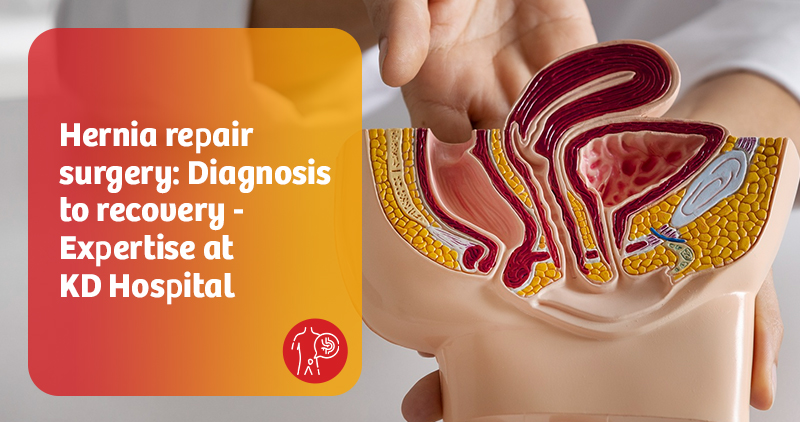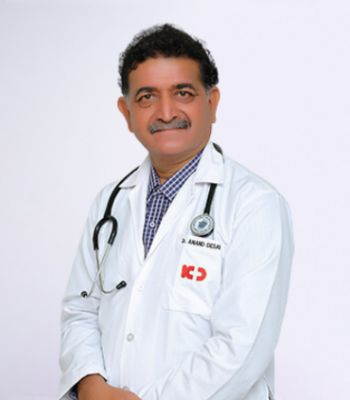Hernia is a common yet often overlooked medical condition that affects millions of people globally. In India, the most common elective surgery is the treatment of inguinal hernias. 15% to 20% of the overall population suffers from a hernia. It is estimated that 1.5 to 2 million people in India suffer from inguinal hernias. (https://mrrjournal.in/uploads/articles/MRR-2024-2-10-2.pdf)
Whether it’s a minor bulge that appears when lifting heavy objects or persistent discomfort in the abdomen, hernias demand timely medical attention. With advancements in surgical techniques and specialised hospitals like KD Hospital, Ahmedabad, patients can undergo hernia repair safely, efficiently, and with quicker recovery times.
This blog explores everything you need to know about Hernia repair surgery — from causes and symptoms to treatment options and recovery while highlighting the surgical excellence at KD Hospital.
What is a hernia?
A hernia occurs when an internal organ or tissue pushes through a weak spot in the surrounding muscle or connective tissue. The most common types of hernias include:
- Inguinal hernia (inner groin)
- Femoral hernia (outer groin)
- Umbilical hernia (around the belly button)
- Hiatal hernia (upper stomach)
- Incisional hernia (through a scar)
While some hernias may be present at birth (called umbilical hernias), many develop over time due to factors such as strain, muscle weakness, post-pregnancy, weightlifting, obesity, or prior surgical procedures.
Causes and risk factors
Several factors contribute to hernia formation, including
- Lifting heavy objects improperly
- Obesity
- Straining during bowel movements or urination
- Pregnancy
- Previous abdominal surgeries
- Family history of hernias
Symptoms of hernia
Hernias may present with various symptoms depending on the type and severity. Common signs include
- A visible bulge in the abdomen or groin, especially when standing or straining
- Pain or discomfort during physical activities
- A feeling of heaviness or dragging sensation
- Nausea or vomiting (in severe cases)
- Constipation or difficulty passing stool
If left untreated, hernias can lead to serious complications such as incarceration (trapped hernia) or strangulation (cut-off blood supply), making early intervention crucial.
When is surgery needed?
While small, asymptomatic hernias might be managed with watchful waiting or lifestyle modifications, most hernias do not heal on their own and require surgical repair.
Surgery is advised if
- The hernia is painful or growing
- It interferes with daily activities
- There is a risk of incarceration or strangulation
- It’s causing gastrointestinal symptoms (e.g. reflux in hiatal hernias)
Types of hernia repair surgeries
KD Hospital offers all hernia repair techniques under one roof, performed by experienced laparoscopic and general surgeons.
1. Open hernia repair (Herniorrhaphy)
- Traditional technique
- Suitable for large or complicated hernias
- Involves an incision to reposition the herniated tissue and reinforce the wall
2. Laparoscopic hernia repair
- Minimally invasive
- It involves small incisions and the use of a laparoscope
- Less pain, shorter hospital stay, faster recovery
3. Robotic hernia repair
- Advanced minimally invasive technique
- Superior 3D visualisation and precision
Available at KD Hospital’s robotic surgery unit for complex or recurrent hernias
KD Hospital’s multidisciplinary team ensures patients receive the most appropriate surgical approach tailored to their condition and lifestyle needs.
Why choose KD Hospital for hernia surgery?
When it comes to surgical intervention, the choice of hospital and surgeon plays a vital role in ensuring a safe and effective outcome. KD Hospital stands out in hernia care for several reasons,
Expert surgeons
- Led by renowned laparoscopic and general surgeons, the hernia surgery team brings years of experience and a high success rate.
Minimally invasive excellence
- KD Hospital is equipped with state-of-the-art laparoscopy and robotic systems, allowing surgeries that are less painful, more precise, and enable faster healing.
Dedicated operation theatres
- Modern, infection-controlled surgical suites designed for advanced hernia procedures.
Patient-centered care
- From pre-operative counselling to post-surgery follow-up, KD Hospital provides holistic care focused on patient comfort and well-being.
Post-operative support
- Rehabilitation, diet consultation, and wound care — all available under one roof.
Recovery after hernia repair
Recovery time depends on the type of surgery performed, the patient’s overall health, and adherence to post-operative instructions.
Typical recovery timeline
- Open surgery: 4-6 weeks for full recovery
- Laparoscopic/Robotic surgery: 1-2 weeks for activity
KD Hospital ensures a smooth recovery process with
- Pain management
- Dietary advice
- Physiotherapy (if needed)
- Regular follow-ups to monitor healing
Life after hernia surgery
Most patients experience an improvement after surgery. They can return to work, exercise, and activities without the discomfort and risks associated with untreated hernias.
Tips for Long-Term Success
- Avoid heavy lifting for the first few weeks
- Maintain a healthy weight
- Treat constipation to prevent straining
- Stop smoking to enhance healing
- Regular check-ups to detect any recurrence early
KD Hospital’s surgical team educates every patient on lifestyle changes and
preventive care post-surgery.
If a hernia is left untreated and surgery is delayed or avoided, several serious complications can occur. While some hernias may remain stable or cause only mild symptoms for a time, most tend to enlarge or worsen over time. Here are the potential complications of not undergoing hernia surgery.
1. Incarcerated hernia
- Definition: A hernia becomes incarcerated when the protruded tissue (usually part of the intestine or fat) gets trapped in the hernia sac and cannot be pushed back into the abdominal cavity.
- Consequences
- Severe pain and swelling
- Intestinal obstruction
- Nausea, vomiting, and constipation
- Urgency: Medical emergency; requires immediate surgical intervention.
2. Strangulated hernia
- Definition: When an incarcerated hernia loses its blood supply due to pressure or twisting, it becomes strangulated.
- Consequences
- Tissue death (gangrene)
- Severe infection or sepsis
- Life-threatening condition
- Symptoms
- Sudden intense pain
- Redness or discoloration of the bulge
- Fever, rapid heartbeat, dizziness
- Urgency: Requires emergency surgery to prevent fatal outcomes.
3. Bowel obstruction
- A hernia can compress part of the intestine, causing a blockage.
- Symptoms include
- Abdominal cramps
- Bloating
- Inability to pass gas or stool
- Prolonged obstruction can damage the intestine and lead to emergency surgery.
4. Increased hernia size
- Over time, the hernia may grow larger and difficult to repair.
- Larger hernias
- Increase surgical complexity.
- Require larger incisions or open surgery.
- It leads to longer recovery periods.
5. Chronic pain and discomfort
- Even if the hernia doesn’t cause an emergency, it may
- Cause persistent discomfort or aching.
- It affects mobility and physical activity.
- Interfere with work and daily life.
- Long-term pain may require medications or lifestyle changes.
6. Impact on quality of life
- Untreated hernias can lead to
- Social embarrassment due to visible bulge
- Limitations on exercise or physical work
- Anxiety over potential complications
- Surgery improves functionality and peace of mind.
7. Risk during other surgeries
- If a person with an untreated hernia undergoes unrelated abdominal surgery (e.g., gallbladder, appendix), the hernia may interfere with that procedure or increase complication risk.
8. Irreversible tissue damage
- In advanced cases, untreated hernias can cause:
- Permanent damage to intestines or organs
- Need for bowel resection (removal of part of the intestine)
- Longer hospitalisation and recovery
In a nutshell
Hernias may seem minor at first, but if neglected, they can become serious. Surgical repair is safe, effective, and truly life-changing — when performed at KD Hospital, Ahmedabad’s leading multi-speciality healthcare destination. With its focus on clinical excellence, advanced technology, and compassionate care, KD Hospital is a trusted name for hernia surgery in Ahmedabad and Gujarat.
If you or a loved one is experiencing symptoms of a hernia, don’t wait. Consult the surgical experts at KD Hospital and take the first step toward a healthier, pain-free life.

